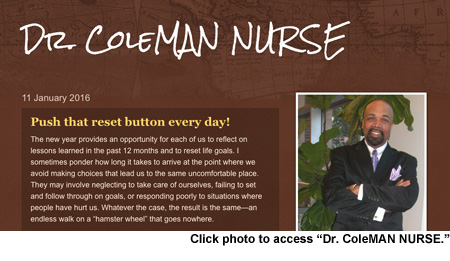Welcome to my blog! Ask questions. Share your successes. Move forward toward your health care goals!
Tuesday, January 26, 2016
Thursday, January 21, 2016
From ‘Dr. ColeMAN NURSE,’ an RNL blog, Push that reset button every day!
|
Why be content with going nowhere?
|
| By Christopher Lance Coleman |
 The new year provides an opportunity for each of us to reflect on lessons learned in the past 12 months and to reset life goals. I sometimes ponder how long it takes to arrive at the point where we avoid making choices that lead us to the same uncomfortable place. They may involve neglecting to take care of ourselves, failing to set and follow through on goals, or responding poorly to situations where people have hurt us. Whatever the case, the result is the same—an endless walk on a “hamster wheel” that goes nowhere.  For
me, this past year has brought increased awareness of how quickly time
is passing and how easy it is to not make the most of the time we have. I
remember my beloved grandmother who firmly believed that taking time
for granted is an irreversible mistake. By the time we realize our
mistake, we find ourselves on the other side of an event that has
disrupted our foundations. Clearly, we cannot stop time or reverse
events that have already occurred. For
me, this past year has brought increased awareness of how quickly time
is passing and how easy it is to not make the most of the time we have. I
remember my beloved grandmother who firmly believed that taking time
for granted is an irreversible mistake. By the time we realize our
mistake, we find ourselves on the other side of an event that has
disrupted our foundations. Clearly, we cannot stop time or reverse
events that have already occurred.
Tragic world events of 2015 remind us all that we cannot take
life for granted. Time is a gift we should use for good, not for
engaging in unproductive or destructive activities. Perhaps you are
among those who pledged at the beginning of 2015 to use your talents and
gifts to improve lives around you. Or you made a commitment to exercise
more or eat better. If you’re like most, the result has been a mixed
bag of successes and failures. The point is, we often find ourselves
pivoting away from life-improving goals toward places of familiarity
that do not move us forward.
How do we stay engaged in working toward goals that move us
forward? We push the reset button every day! Each day, we resolve to be
our best, fully committing ourselves to excellence in all we do, whether
it’s exercise, work, developing friendships, or nurturing family
relationships. Like you, I have learned many lessons over the years. One
is, if I don’t take care of myself, I can’t improve the lives of those
around me.
As you ponder what you want to accomplish in 2016, remember
to invest in yourself so you can be that change agent who positively
impacts the lives of others. RNL
Christopher Lance Coleman, PhD,
MS, MPH, FAAN, is Fagin Term Associate Professor of Nursing and
Multicultural Diversity and associate professor of nursing in psychiatry
at the University of Pennsylvania (UPenn) School of Nursing. He is
senior fellow in the Center for Public Health Initiatives at UPenn and
Institute on Aging Fellows in the Family and Community Health Division,
Department of Psychiatry, School of Medicine at UPenn. He is also the
author of Man Up! A Practical Guide for Men in Nursing, published by the Honor Society of Nursing, Sigma Theta Tau International.
|
Subscribe to:
Comments (Atom)